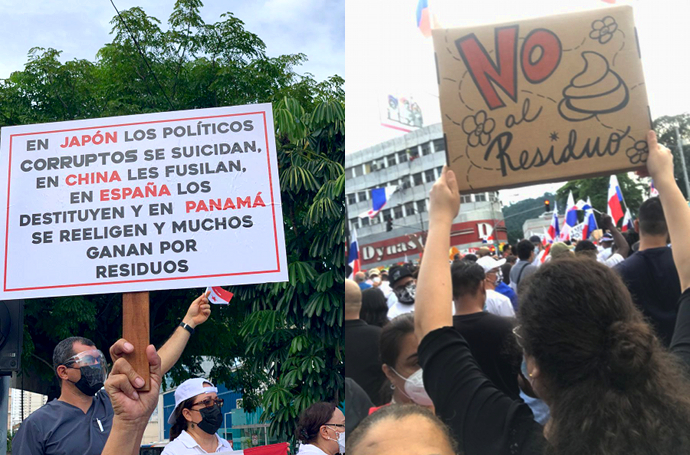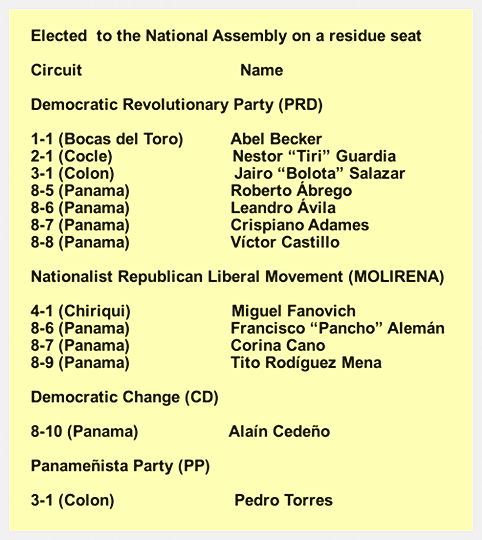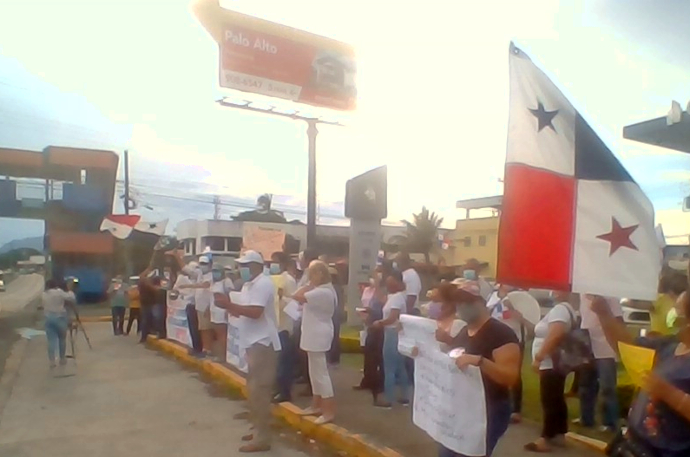Scenes from the September 14 demonstration in front of the National Assembly. Photos posted on Twitter feeds.
How “residuo” is being made into a dirtier word than before
by Eric Jackson
Are we to, literally or figuratively, separate the wheat from the chaff? And do so in Panamanian Spanish, well beyond what dictionaries and Google Translate say?
The chaff is the residue after winnowing grain. To burn or throw away the rice hulls is a common agricultural error here, but generally there are enlightened farmers and gardeners who want that stuff for fertilzer or mulch.
One Spanish word for the chaff, especially common in the lands that used to be part of the Viceroyalty of New Granada — places like Panama, Colombia and Venezuela — is “vaina.” That word, often pronounced with a hard Spanish “v” that sounds to gringo ears like a “b” — as in “baina” — has a great many meanings in this part. Yes, it can mean the sheath for your machete, but let’s concentrate on things related to the chaff meaning. Let’s use some polite English, even if the colloquial equivalents are anything but polite. Annoyance. Criminal activity. Trouble. The kind of people who create such things.
In Noriega times, insurance man and post-invasion Vice President famously declared “¡Esta vaina se acabó!” Noriega’s Dignity Battalions beat the hell out of him, but as to the reign of the US-trained strongman, after much more violence and tragedy this [annoyance] WAS over. Or some of it was.
Panama still lives under the dictatorship’s constitution, which embeds political patronage and its inherent incentives for corruption into the structure of our government. One strange feature of the Panamanian system is the combination of single-member, first past-the-post-gets-elected legislative circuits and, for most of the deputies, an odd mutation of a sort of proportional representation in the multi-member circuits. Everyone elected to the legislature out of the metro area, where most of Panama’s population lives, comes from a multi-member circuit. A deputy’s mandate might be based upon the “quotient,” the “half-quotient” or the “residue.” It’s an arcane way of counting, which in many cases results in someone getting elected on a residue even though someone running in the same circuit got more votes but did not get a seat in the National Assembly.
HOW arcane is the system? Consider:
Article 403. In the case of electoral circuits that elect two or more deputies, the Electoral Circuit Scrutiny Boards shall proclaim the candidates elected from compliance with the following rules:
1. The total number of valid votes cast in the circuit by all voters is divided by the number of citizens to be elected. The result of this division it will be called the electoral quotient.
2. The total number of unique ballots obtained by each candidate list is divided by the electoral quotient, and the result of this operation will be the number of candidates that it corresponds to choose the party that would have launched the list of treaty or respective free application list.
3. If there are positions to be filled to complete the number of candidates who have to chosen, one will be awarded to each of the remaining lists that have obtained a number of unique voting ballots not less than half the electoral quotient in the order by which said lists have obtained unique voting ballots. The parties or independent lists that have obtained the electoral quotient will not have the right to the half quotient.
4. If there are still positions to be filled, the most voted candidates will be awarded a once the quotient and a half quotient are applied.
For the award of the post by residue, all the votes obtained by each candidate in all the lists in which they have been nominated, but in any case the seat will be assigned to the party to which the candidate belongs, bearing in mind that a party only may obtain only one seat per residue.
Article 404. When a party or an independent list has the right to one or more Deputy positions in a multi-member circuit, the principal and elect shall be declared alternates are the candidates who, as such, have obtained the greatest number of votes.
Who tends to get declared the loser against someone who got fewer votes and was declared the winner?
An independent or small party candidate, in a circuit where there was no full slate of independents — often times because the Electoral Tribunal limited the number of independents on the ballot so that there could be no full slate — or of a small party that just didn’t have the candidates to field there. A candidate on a coalition ticket, wherein another candidate on that slate belonged to the “right” party to receive a seat by residue despite fewer votes.
And some of the current crop of winners:
Enough of the most notorious deputies have their seats due to the residue rule that there is this play on words, wherein as chaff is a sort of residue, one sort of vaina is synonymous with residuo. As you might notice in one of the placards shown above. Part of Panamanian opposition politics today is to enhance that similarity, to make residuo an epithet.
Not all of the legislators by residue are notorious jerks. Some may feel relieved that they barely snuck in and are trying to keep their noses clean and become noteworthy for a few good things, such that in the next elections they come back with a more respectable mandate.
At the moment, though, the president of the National Assembly is a physician, Dr. Crispiano Adames, legislator by residue and father of a medical student. His big legislative effort in these plague times? He proposed to lower the test scores for medical school graduates to get licensed to practice. The private fly-by-night “universities” loved it, but the University of Panama medical faculty and most of the nation’s medical organizations hated it and saw to it that the proposal went nowhere in the legislature — only to see it enacted by the Ministry of Health.
Sitting before Adames among the residuary deputies there is Colon’s Jairo Bolota Salazar. The guy has a penchant for grabbing headlines — most recently and in violation of historic preservation laws demolishing designated national legacy buildings in Colon’s city center. Whether it’s gay bashing, throwing things at his colleagues or picking arguments with the police for wrong reasons, Bolota acts as if any news coverage is good coverage.
Then, allied with Adames’s PRD is the MOLIRENA caucus, one of whose deputies by residue is religious right leader Corina Cano. It’s perhaps historically ironic that she sits as a member of the last political party that has the word “Liberal” in its name, given that the Panamanian Liberal tradition that stretches back into the Colombian period was always identified as much by its advocacy of secular government as by its representation of commercial and industrial interests rather than the large rural landowners who dominated the Conservatives. Civil wars were fought by Liberals over that separation of church and state principle, but that was then.
Also in the fractious MOLIRENA caucus, there is the legislator by residue Tito Rodríguez, maker of perhaps the most insufferable declarations in favor of political patronage that Panama has seen in recent years.
In Penonome, which has a low-key PRD legislator in a seat allocated by residue, people protested mainly about things that the current National Assembly and president have done, but the subject that brought them out was proposed changes to the electoral laws, which, residue and all, they think leaves them without responsive representation. Archive photo by Eric Jackson.
And so Panama’s evolving political rhetoric goes, with the attempt by opposition forces to smear the product of an arcane election system into sewage imagery, transforming “residuo” into this generation’s “vaina.” It seems to be working.
But is something missing?
There is strong sentiment throughout that land that Panama needs not only new election laws, but a reformed political culture and a new constitution. But how do we get there, and specifically which changes do we need and want? That’s where opposition to an unpopular government breaks down. The petition drive for a parallel constitutional convention — subject to the rules and limits of the Electoral Tribunal, the Supreme Court, the Presidency and the National Assembly — is a dead letter. The alternative to that would be a referendum to allow the convening of an originating constitutional convention, which assumes all state powers while in session to draft a proposed new political system. Even then, would people elect all the usual suspect, in large part on votes being traded for bags or groceries?
The discontent with what we have is easy enough to see, but a specific alternative that captures the public imagination? Not yet.
Contact us by email at / Contáctanos por correo electrónico a fund4thepanamanews@gmail.com
To fend off hackers, organized trolls and other online vandalism, our website comments feature is switched off. Instead, come to our Facebook page to join in the discussion.
Para defendernos de los piratas informáticos, los trolls organizados y otros actos de vandalismo en línea, la función de comentarios de nuestro sitio web está desactivada. En cambio, ven a nuestra página de Facebook para unirte a la discusión.


















